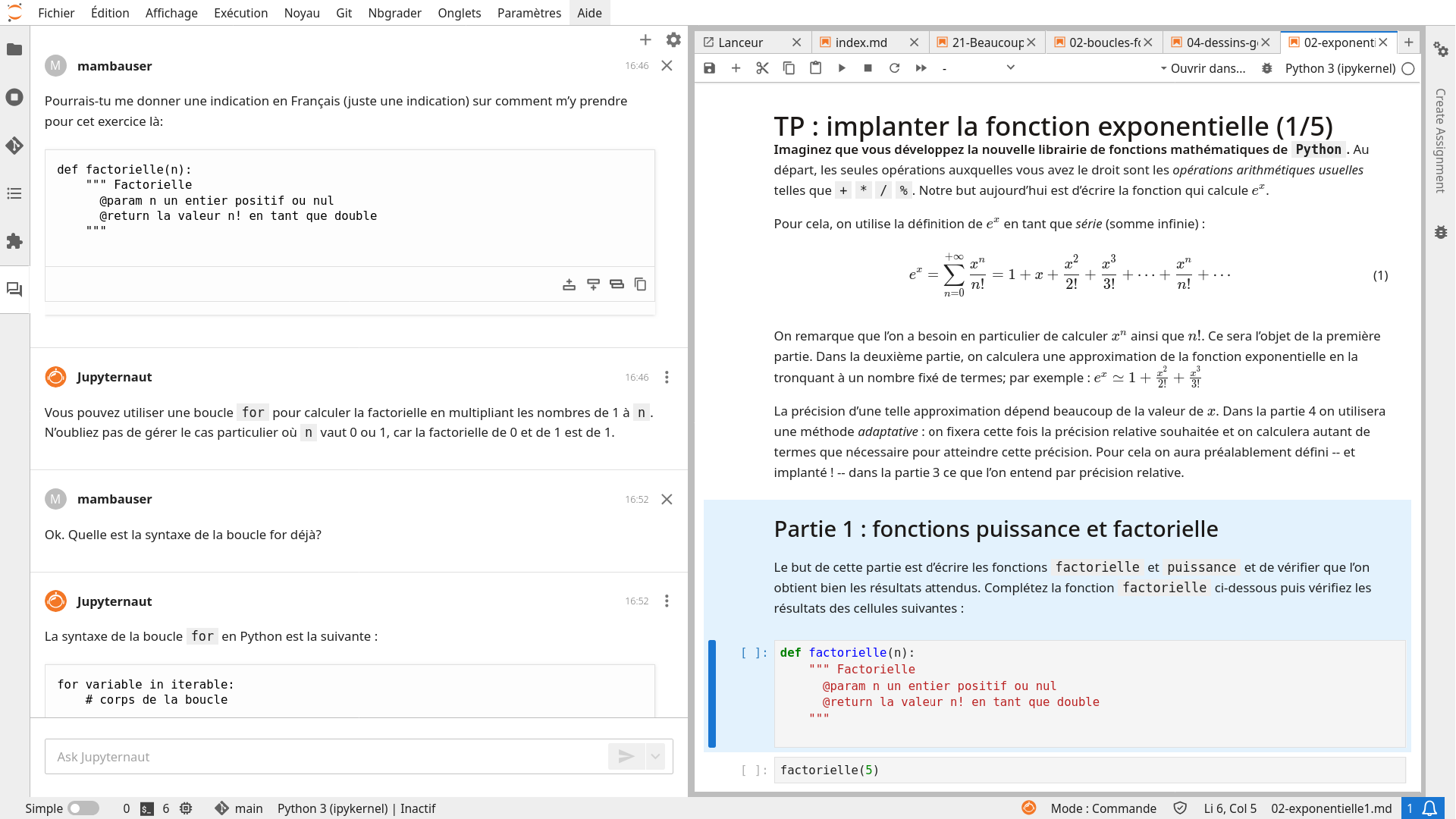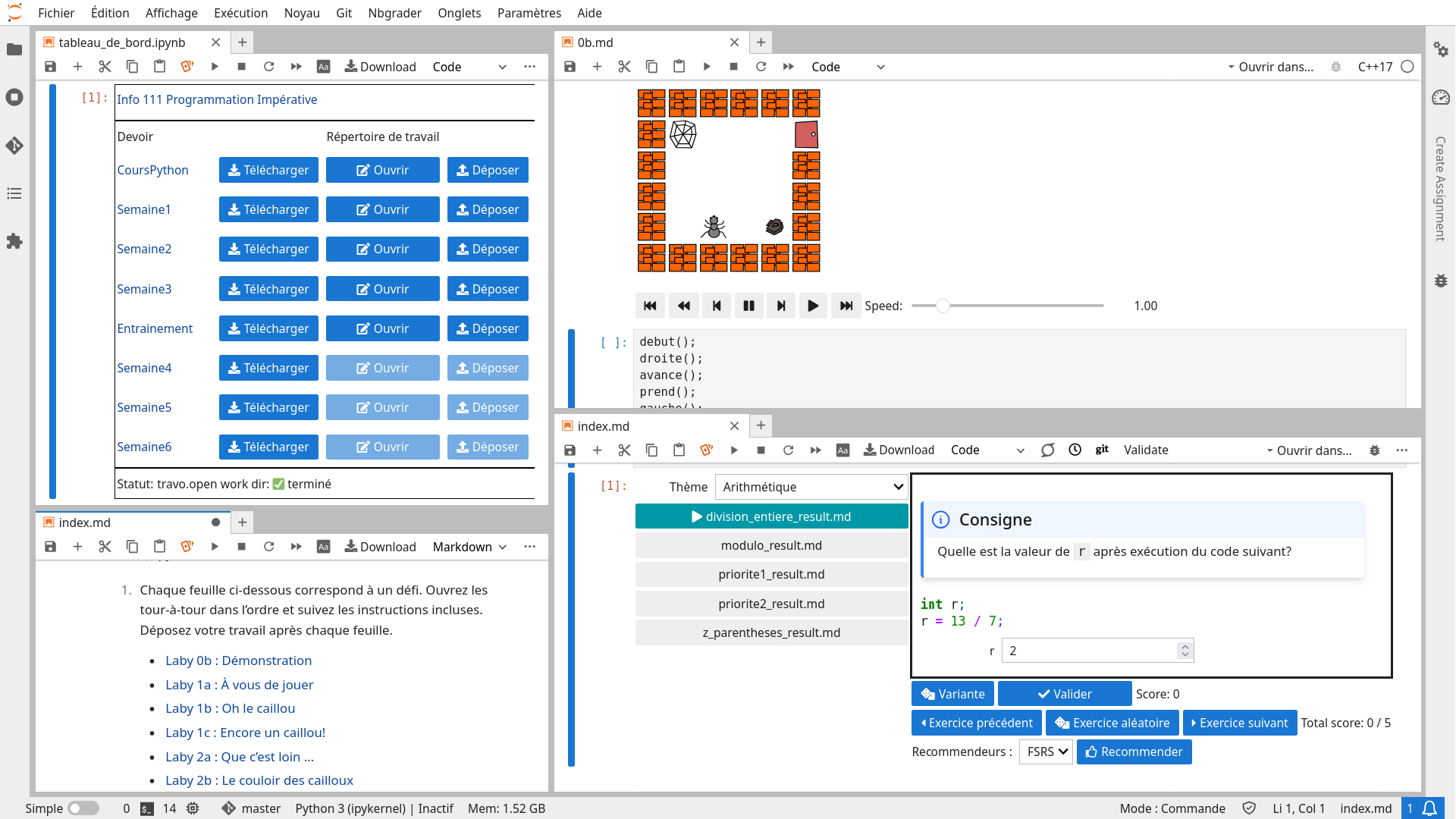Sharing computational training material at larger scale: a French multi-tenant attempt#
Nicolas M. Thiéry, Professor, Laboratoire Interdisciplinaire des Sciences du Numérique (LISN), Université Paris-Saclay
Joint work with Pierre Augier, Éléonore Barthelian, Françoise Conil, Loïc Grobol, Chiara Marmo, Olha Nahorna, Pierre Poulain, N. T., Jeremy Laforet, …
October 1st of 2025, PyData Paris 2025
Abstract#
With the rise of computation and data as pillars of science, institutions are struggling to provide large-scale training to their students and staff. Often, this leads to redundant, fragmented efforts, with each organization producing its own bespoke training material. In this talk, we report on a collaborative multi-tenant initiative to produce a shared corpus of interactive training resources in the Python language, designed as a digital common that can be adapted to diverse contexts and formats in French higher education and beyond.
Despite continuous efforts like Unisciel or FUN MOOC, training material reuse remains very limited in French higher education. To some extent, this is cultural with curricula that are not standardized across universities and the absence of a textbook tradition. Beyond intellectual property, language, and cultural barriers, instructors need or want to adapt the training material to the split in teaching units, the audience, the format, and pedagogical choices. Computational training material pose unique challenges as they require adapting to various technological choices or constraints including programming language, computational libraries, computing environments, and infrastructure. Also they needs to be continuously maintained to adapt to the evolving technology which is incompatible with reuse patterns such as “copy-and-forget”.
We describe the team’s use cases (from undergraduate to lifelong teaching, computer science students to non specialists, intensive week-long workshops to unsupervised), the sources of inspiration and reuse (MOOC’s, Software Carpentry, …), the current status and content (introductory programming, …, development tools, and best practices), the computational environment and authoring tools (Jupyter, MyST, Jupyter-Book, version control, software forge, and CI) and explore some levers to facilitate sharing and reuse (modularity, gamification and decontextualisation, portability, adaptive learning, machine assisted multilingual authoring).
This talk is intended for instructors, students, potential contributors, and anyone interested in computational and scientific software engineering education.
Yet another Python course? Really? Why?#
Observations#
Rise of Computation and Data
as pillar of science, and beyond …
Major training needs
Computing, data processing, machine learning, …
Programming, software engineering, open science, …
Major efforts
MOOC’s: Python, Scikit learn, FIDDLE, …
Online platforms: France IOI, …
Libraries of teaching resources: Unisciel, …
Software Carpentry, …
A flurry of courses delivered by universities, SME’s, …
Yet, in practice
Very little reuse
Example at Université Paris-Saclay
aim to deliver some basic computational training to most students (and staff)
10+ independently crafted teaching units
covering about the same scope:
«Computing 101»: basic programming, computing and visualizationusing about the same technology:
Python, Jupyter, numpy, pandas, matplotlib, …
Barriers to reuse of computational training material in higher education#
Cultural barriers
no standardized modular curricula
no textbook tradition
barely emerging open science tradition in education
language: French? English?
personal touch on education
Technological barriers
programming language, computational libraries, …
computing environment, infrastructure, …
quickly evolving technology, paradigms, and even science
personal taste
Diversity of public
complete beginners to experts (possibly in the same room)
from math, physics, computer science, chemistry, biology, geosciences, sports sciences, economists, humanities, …
bachelor, master, PhD, engineers, researchers, …
How to grab their interest? Fit their constraints?
Diversity of formats
online courses
small to large scale physical courses (10-300 students, one semester)
intensive training sessions and summer schools (3-5 days)
lectures? recitations? projects?
Time pressure
high quality, reusable and reused: a high value long term investment
quick and dirty: oh well, good enough for tomorrow’s class
Py-edu-fr in a nutshell#
An emerging cross institution cross profession community
De Pierre Augier, calcul@listes.math.cnrs.fr, 15/01/2025:
«… Je me dis que travailler uniquement à l’échelle de notre petit groupe à Grenoble est un peu dommage et qu’un niveau national (ou même francophone) serait raisonnable. …»
Pierre Augier, Researcher in Fluid Mechanics, CNRS, Université Grenoble Alpes
Eleonore Barthenlian, Data scientist
Françoise Conil, CNRS Software Engineer at LIRIS laboratory in Lyon
Loïc Grobol, Associate Professor in Computational Linguistics at Université Paris Nanterre
Chiara Marmo, Research Software Engineer in Astronomy, Geosciences and Computer Science, Université Paris-Saclay
Olha Nahorna, Research Engineer in Data Analysis, CNRS, Bordeaux Sciences Économiques (BSE)
Pierre Poulain, Associate Professor in bioinformatics, Université Paris Cité
N. T., Professor in Computer Science, Université Paris-Saclay
Jeremy Laforet, Research Engineer in Biomedical modeling, CNRS
… and you?
trying to share open educational material
Python based?
for Higher Education and Research?
for France? French speaking countries?
FAIR principles: Findable, Accessible, Accessible, Interoperable, Reusable

Current status#
Content
Introduction à la programmation avec Python et Jupyter (“Programming and Computing 101”)
In French
About 80 Jupyter worksheets / 14h of course
Building on previous work in Paris-Saclay and elsewhere
Available online and beta tested
In planning: larger adoption in Paris-Saclay
Initiation to Python
In English
A separate course? Or a translation of the above?
Advanced Python for sciences
Plenty of material to be imported
Infrastructure
Web site (👍 Findable, Accessible)
Public forge (👍 Accessible)
Using mercurialTooling (see below)
Institutional support and funding
Python work group of the CNRS professional networks “Calcul” and “DevLog”
Funding by CMA SaclAI-School
Design#
Engaging the student#
You can do it! And it’s fun!#
Gamification
Can you program the ant out of the maze?
from laby.global_fr import *
Laby(niveau="2a")
avance()
avance()
avance()
avance()
avance()
Engaging, with (mostly) no prerequisites.
A good old effective idea
Mindstorms: Children, Computers, and Powerful Ideas, S. Papert, 1980
original version of Laby by Gimenez et al.
similar to, e.g., France IOI’s robots
Could we share that widget?
It’s power!#
Do interesting stuff ASAP
The Python ecosystem rocks here!
Potential: image, sound, 3D geometry, you name it
Domain Context or not?
Solving problems in mathematics, biology, humanities, …
💡Makes things concrete
“Oh that’s what it means, in my world”👍Engages
“Oh, that would be useful, in my world”🫨Adds cognitive load, distracts
Adds prerequisites (👎 Reuse)
Tentative resolution
Most of the material without domain context
Select material rooted in context
With conclusion to abstract awayMini projects rooted in context
It’s science#
Main learning objective
analyze programs and reason on them
predict, and control their behavior
Strategy
Introducing concepts
Introducing models (for the memory, …)
As simple as possible, but no simpler; and iterate
Example: at first, you don’t need to know how integer are stored in memoryDefining the syntax and semantic of constructs in these models
Learning to analyze step by step (syllabic method first; then global)
A key learning tool: the step-by-step debugger
simplify the JupyterLab interface
support in JupyterLite
Fostering reusability and reuse#
Producing and reusing open content
License: Creative Commons ShareAlike (👍 Accessible, Reusable)
Reuse:
Programmation Python pour les sciences de la vie Patrick Fuchs et Pierre Poulain
Info 111 Programmation Impérative T. et al.
…
Modularity (👍 Reusable)#
A collection of courses learning activities
Learning activity (aka Learning nuggets):
A narrative
Possibly with interactivity, self assessment, …
With explicit prerequisites and learning objectives (ongoing)
Example: mini course, exercise, mini-project, …
From which courses can be composed
Write a narrative referencing the chosen activities
Or just steal the activities you like
Adaptive learning?
Empower the learner: own pace, own helpers, …
Offer a personalized experience to the learner
Challenges
Granularity?
Decontextualize the content
Where to host transitions?
Format#
Learning unit = Markdown (+ MyST) file with metadata
Simple and standard (👍 interoperable, reusable, sustainable)
Can include learning metadata (👍 findable, adaptive)
Prerequisites, learning objectives, difficultyCan include solutions, instructor notes, … (👍 adaptive)
Can be interactive (👍 engaging)
Markdown based Jupyter notebooksCan include self assessment (👍 adaptive, engaging) nbgrader, jupylates, …
Can be randomized (👍 adaptive)
Easy to version control (👍 accessible)
Easy to export: pdf, web, … (👍 accessible)
Jupyter-Book, MySTmd, Quarto, …Easy to transforms
grammar-check, automated formatting, solution striping … (👍 reuse)
---
jupytext:
...
learning:
objectives:
apply: [fonction]
prerequisites:
apply: [boucle for]
---
# TP : implanter la fonction exponentielle (1/5)
**Imaginez que vous développez ...**
Pour cela, on utilise la définition de $e^x$ en tant que *série* (somme infinie) :
$$e^x = \sum_{n=0}^{+\infty} \frac{x^n}{n!} = 1 + x + \frac{x^2}{2!} + \frac{x^3}{3!} +\cdots+\frac{x^n}{n!}+\cdots$$
...
```{code-cell}
:tags: [answer]
def factorielle(n):
### BEGIN SOLUTION
r = 1.0
for i in range(1, n+1):
r *= i # Rappel: c'est équivalent à r = r * i
return r
### END SOLUTION
```


Desirable tooling improvements
standardization of markdown-based format for Jupyter
support for macros in JupyterLab-MyST
easy export to slides on the web
…
Adaptive learning (👍 autonomy, engaging)#
Tooling (work in progress)
Learning records: track the student activity
Learner model: estimate the student abilities
from learning records
from learning metadata
Traffic lights: ready to engage into that activity?
Student dashboard: display progress, recommend activities
Multilingual?#
Aim: introductory courses in French and English
A maintenance nightmare?
Use Machine Translation assistance (work in progress) (👍 reuse)
Use Translate dir (beta): DobbiKov/translate-dir-cli
By Yehor Kotorenko (and T.)
Incremental translation
Preserves syntax and structure
Preserves terminology
Preserves post-edits and style
Uses your favorite LLM
Integrates in your favorite git workflow
Ease deployment#
The learner can work on the courses:
Online, with JupyterLite
Online, with your favorite virtual environment (jupyterhub, mydocker, …)
Locally, on laptop, computer lab, …
Discussion#
notebooks ?
Feedback from users
Thank you for your attention!#
py-edu-fr
https://py-edu-fr.pages.heptapod.net/edu.html
Get involved!
talk to us at PyData!
Pierre Augier, Chiara Marmo, Pierre Poulain, N. T.try the course(s)
test the course(s) in the classroom
reuse worksheets
provide feedback
contribute worksheets, exercises
improve the tooling: MyST, debugger
Upcoming sprints
PyData Paris 2025: Thursday afternoon
PyConFR Lyon 2025: October 30-31, Lyon
Sponsors
CMA SaclAI-School, CNRS WorkGroups Calcul and DevLog, …
Upcoming jobs at Paris-Saclay: project ATLAS - AI for Teaching and Learning (AI) at Scale
Post-doc to conduct research in education and human-centric design and computing
Research Software Engineer: javascript, jupyter, …
